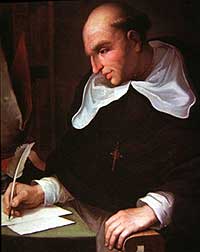Bartolomé de las Casas

Bartolomé de las Casas, O.P. (August 24 1484 – July 17 1566), was a 16th century Spanish Dominican priest, and the first resident Bishop of Chiapas. As a settler in the New World he witnessed, and was driven to oppose, the torture and genocide of the Native Americans by the Spanish colonists.
Contents |
Biography
Bartolome de las Casas was born in Seville in 1484.[1] With his father, he emigrated to the Caribbean island of Hispaniola in 1502 on the expedition of Nicolás de Ovando, during which he witnessed the extermination of the Taínos. He became a priest eight years later, and served as a missionary to the Arawak (Taino) of Cuba in 1512. There, he received a repartimiento (a grant of native labor) which he exploited. Starting in 1514, however, he became an adamant opponent of Spanish colonialism, joining the Dominican Order in 1522. His 1520-21 attempt to create a more equitable colonial society in Venezuela was sabotaged by his colonial neighbors. He died in Madrid.
Legacy and commemoration
Las Casas began what became known as the "Black Legend", which created stereotypical images of the Spaniards as rapacious colonists and Indians as innocents.[2] Some scholars now believe that, among the various contributing factors, epidemic disease was the overwhelming cause of the population decline of the Native Americans because of their lack of immunity to new diseases brought from Europe.[3] However, slavery, serfdom and warfare still inflicted casualties on the genocidal level.
He is commemorated as a missionary in the Calendar of Saints of the Evangelical Lutheran Church in America on July 17. In 2000, the Roman Catholic Church began the process to beatify him. His work is a particular inspiration behind the work of the Las Casas Institute at Blackfriars Hall, Oxford.[4]
Works
- Las Casas, Bartolomé de (1999), Short Account of the Destruction of the Indies, London: Penguin, ISBN 978-0140445626. Trans. Nigel Griffin.
- Las Casas, Bartolomé de (1997), Apologetic History of the Indies, Columbia University Sources of Medieval History, http://www.columbia.edu/acis/ets/CCREAD/lascasas.htm. Extracts.
See also
- Population history of American indigenous peoples
- Valladolid debate
- San Cristóbal de las Casas
- Laws of Burgos
Notes
- ↑ Parish, Helen Brand; Weidman, S. J., Harold E (August 1976), "The Correct Birthdate of Bartolomé de las Casas", Hispanic American Historical Review 56 (3): 385–403, http://www.jstor.org/stable/2514372
- ↑ Cultural Readings - Viewers and the Viewed - Black Legends
- ↑ Stacy Goodling, "Effects of European Diseases on the Inhabitants of the New World"
- ↑ Las Casas Institute at Blackfriars Hall website